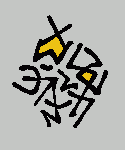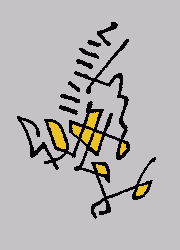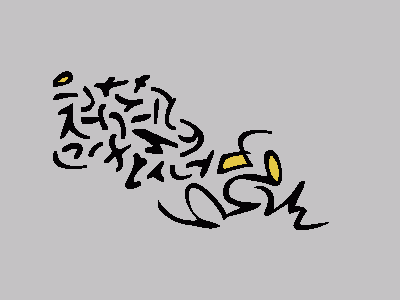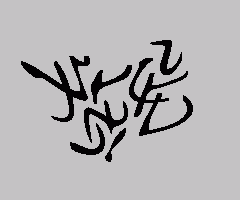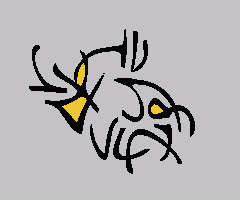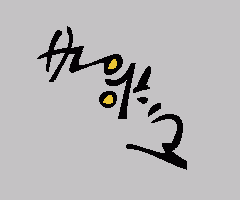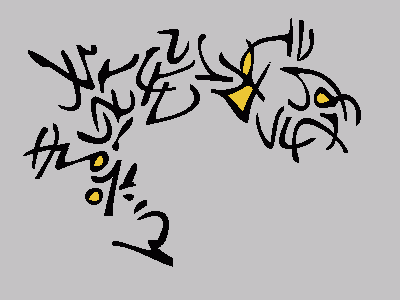
This is a portrait of the three angels of the Lorwolm.
Ga-ukogomen is the largest figure in the center. Nihr Avna-attu is the figure on the right, Tsitao-utna is on the left, and on the far left is a fourth angel, an entity named Yohrdith Eondhel. He is a faint presence in this picture because I have met him only once.
I met the new angel in the grocercy store. I was in the pasta aisle, gazing at jars of Newman's Own spaghetti sauce, when I became aware of someone standing close beside me, at least a foot taller than me. I turned and looked up into a face that bore a smooth porcelain resemblance to a young Paul Newman, as Nathan Hale perhaps, or Billy the Kid from
The Left Handed Gun. A Paul Newman with long hair in greenish brown Pre-Raphaelite curls, more green than brown. He was the biggest, most solid, most human-looking angel I had ever seen, with the round limbs of angels in Italian Renaissance paintings, best described by the word "comely". He was dressed in a dull red t-shirt and worn-out jeans, and for a moment I thought, no, this cannot be an angel, this must be another shopper. Then I noticed he was barefoot, and his feet were clean and pale. I looked back at his face and I no longer saw anything like Paul Newman because that face was composed in a serenity I am sure no living human can achieve.
A feeling like terror clutches my heart when the Lorwolm appear, but it is not terror. It is a physical clenching; it is my body's recognition of an angel's presence. I felt this signal while standing in the grocery store beside this angel who seemed to be studying a dead man's face on spaghetti sauce jars.
"He wears a different hat," the angel spoke. It sounded like a solemn pronouncement of great significance.
"Who wears a different hat?" I asked.
He lifted the index finger of his left hand in answer and pointed to a label on one of the jars. His finger stopped an inch short of touching the jar, but the jar jerked and rattled against the other jars. The angel lowered his hand. The jars became still.
"Who are you?" I asked.
The angel turned his eyes to me. They seemed to be perfectly normal eyes, I was glad to see. They were clear and beautiful, gray-blue in color.
"I am your death beyond hell," said the angel.
That was a nasty shock. "You are my death beyond hell? What are you talking about? There is no hell, right?" Ga-ukogomen had told me there is no hell. It is not needed. Human souls manage to punish themselves more than adequately.
"I am not your death. I am..." he began to speak slowly and with empahasis, "...your...death...eyond...hell."
"I don't get it. You are not my death, but you are my death beyond hell?"
"No. No. My name is not "my death". My name is Your Death Eyond Hell." He peered at me with a look of bemused anxiety that made him seem quite human.
"Your name is Your Death--wait a minute." It finally occured to me why we were misunderstanding each other. "Spell it. Spell your name in English, can you do that?"
"Surely. I can spell my name in thirty-three languages and fourteen alphabets." His smile was beatific, his tone was supercilious. Until I met one, I never realized how much angels like to brag about themselves.
That was my introduction to Yohrdith Eondhel, three months ago. I have not seen him since.
